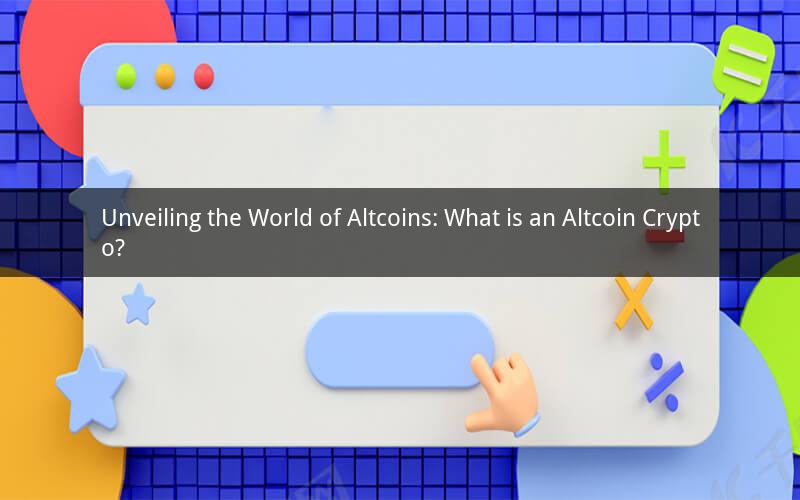
Introduction:
In the vast realm of cryptocurrencies, Bitcoin often takes center stage. However, there is a whole universe of altcoins that coexist alongside Bitcoin, each with its unique features and purposes. But what exactly is an altcoin crypto? In this article, we will delve into the world of altcoins, exploring their definition, history, popularity, and potential future.
1. Definition of an Altcoin Crypto:
An altcoin, short for alternative coin, refers to any cryptocurrency other than Bitcoin. These digital currencies were created to offer alternative features, improvements, or solutions to Bitcoin's limitations. Altcoins aim to provide enhanced security, faster transactions, lower fees, or unique functionalities that differentiate them from Bitcoin.
2. The Birth of Altcoins:
The concept of altcoins originated shortly after the creation of Bitcoin in 2009. As Bitcoin gained popularity, developers and enthusiasts sought to address certain drawbacks or introduce new ideas. The first major altcoin, Litecoin, was launched in 2011 by Charlie Lee, a former Google employee. Since then, numerous altcoins have emerged, each with its own set of features and goals.
3. Popularity of Altcoins:
Altcoins have gained significant popularity over the years. While Bitcoin remains the dominant cryptocurrency, altcoins have captured the attention of investors, developers, and enthusiasts worldwide. The increasing number of altcoins and their diverse range of functionalities have contributed to the overall growth of the cryptocurrency market.
4. Features and Benefits of Altcoins:
Altcoins offer various features and benefits that differentiate them from Bitcoin. Here are some key aspects:
a. Enhanced Security: Many altcoins implement advanced cryptographic algorithms to provide improved security compared to Bitcoin. This includes enhanced privacy features and resistance to certain types of attacks.
b. Faster Transactions: Altcoins often offer faster transaction speeds compared to Bitcoin. This is due to their underlying blockchain technology, which can process transactions more quickly and efficiently.
c. Lower Fees: Altcoins typically have lower transaction fees compared to Bitcoin. This makes them more cost-effective for users who frequently engage in cryptocurrency transactions.
d. Unique Functionalities: Altcoins often introduce unique functionalities that cater to specific use cases. For example, some altcoins focus on privacy, while others aim to facilitate cross-border payments or offer decentralized applications (DApps).
5. The Potential Future of Altcoins:
The future of altcoins is uncertain, but there are several factors that could shape their trajectory:
a. Technological Advancements: As blockchain technology continues to evolve, altcoins have the potential to introduce innovative features and improvements. This could further differentiate them from Bitcoin and increase their adoption.
b. Regulatory Environment: The regulatory landscape surrounding cryptocurrencies is still evolving. Altcoins may face varying degrees of regulation, which could impact their growth and adoption.
c. Market Competition: The cryptocurrency market is highly competitive, with numerous altcoins vying for attention. Altcoins that can establish a strong presence and demonstrate their value proposition are more likely to succeed.
d. Public Perception: Public perception plays a crucial role in the success of altcoins. Positive media coverage, widespread adoption, and a strong community can contribute to the growth of altcoins.
Frequently Asked Questions:
1. What is the difference between Bitcoin and altcoins?
Bitcoin is the first and most well-known cryptocurrency, while altcoins are alternative cryptocurrencies that offer different features and functionalities compared to Bitcoin.
2. Are altcoins more secure than Bitcoin?
Altcoins can offer enhanced security features compared to Bitcoin, but it ultimately depends on the specific implementation and the underlying blockchain technology.
3. Can altcoins replace Bitcoin?
While altcoins have their own unique features and benefits, it is unlikely that they will completely replace Bitcoin. Bitcoin remains the dominant cryptocurrency, and altcoins are more likely to coexist alongside it.
4. Are altcoins a good investment?
Investing in altcoins can be risky, as the cryptocurrency market is highly volatile. It is important to conduct thorough research and consider your own risk tolerance before investing in altcoins.
5. How can I buy altcoins?
You can purchase altcoins through various cryptocurrency exchanges. Simply create an account, deposit funds, and search for the altcoin you wish to buy. Be cautious and ensure the exchange is reputable and secure.
Conclusion:
Altcoins have become an integral part of the cryptocurrency ecosystem, offering alternative features and functionalities to Bitcoin. With their diverse range of benefits and potential for future growth, altcoins continue to attract attention from investors and enthusiasts. Understanding the world of altcoins can help individuals make informed decisions and explore the vast possibilities that the cryptocurrency market has to offer.